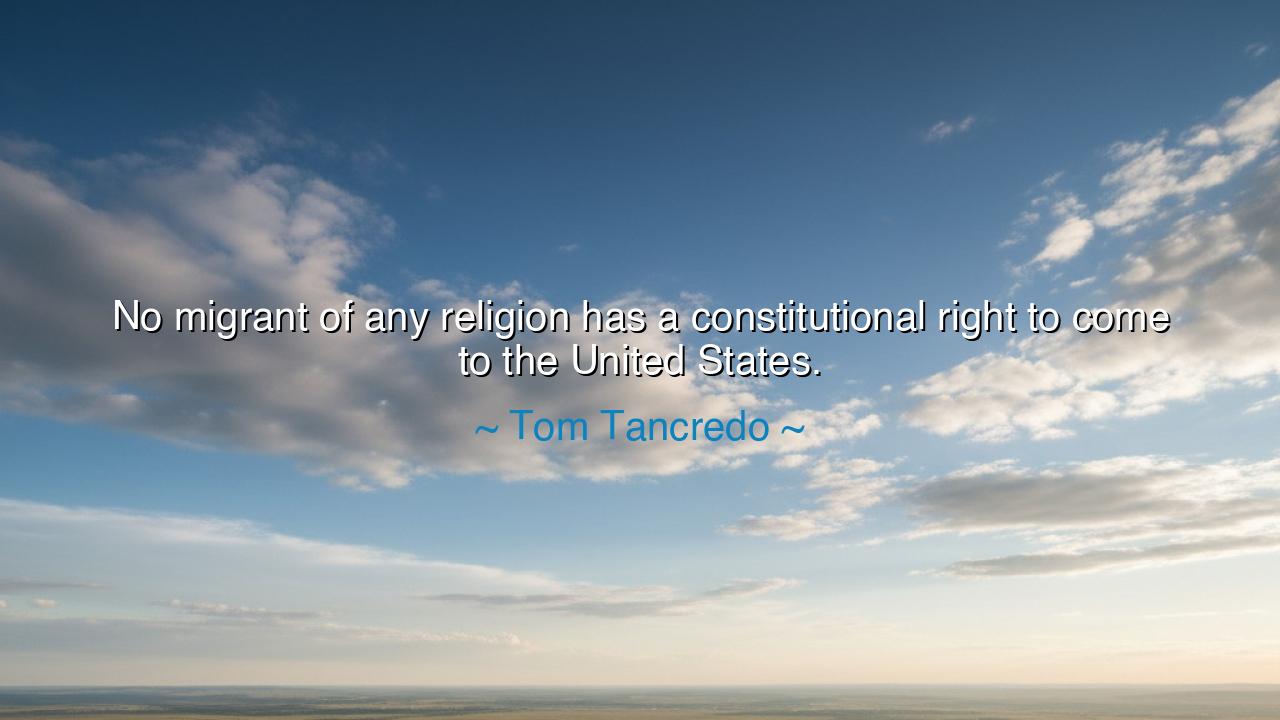
No migrant of any religion has a constitutional right to come to






"No migrant of any religion has a constitutional right to come to the United States." These words by Tom Tancredo speak directly to the complex issue of immigration and the legal rights of migrants. Tancredo's statement asserts that, regardless of the religion or identity of the migrant, they have no inherent right to enter the United States. The heart of his argument lies in the belief that the U.S., as a nation, holds the authority to control its borders and decide who can enter, irrespective of any moral or ethical considerations related to the individual’s background. This quote echoes the longstanding debate between national sovereignty and the moral responsibility of nations to welcome those in need.
The origin of this sentiment can be traced to the age-old conflict between law and ethics. In ancient Greece, the philosopher Socrates engaged in debates over the nature of justice and the role of the state in enforcing laws. The Sophists, like Protagoras, argued that truth and justice were relative to the circumstances, while Socrates emphasized the existence of universal moral principles that transcended laws. This debate between the relative authority of the state and the universal right to justice continues today, particularly in discussions on immigration and human rights. Tancredo’s quote represents the modern perspective that borders and national laws should take precedence over a universal obligation to provide sanctuary, drawing upon centuries-old principles of sovereignty.
Consider the example of Ancient Rome, a civilization that, for much of its history, controlled an empire that spanned vast territories and peoples. The Roman Empire, in its grandeur, was faced with the issue of integration and assimilation of foreign peoples into its empire. Roman citizenship was a prized possession, one that was often given to conquered peoples and migrants who contributed to the empire. The empire’s laws and structure were designed to integrate and manage the flow of migrants, but at times it was also fiercely protective of its borders and national identity. This balance between the welcome of foreigners and the protection of the Roman state mirrors today’s challenges in managing migration — where nations must weigh the moral obligations to help those in need against the practical necessity of controlling immigration.
In more recent history, the American Revolution and the founding of the United States were deeply rooted in the concept of self-determination. Thomas Jefferson and the other founding fathers established the nation with a sense of national sovereignty — that the people of the new nation had the right to define their government and their boundaries. This belief in sovereignty shaped the U.S. Constitution, which grants the federal government the authority to determine issues of immigration. However, this constitutional right to determine immigration policy has often clashed with the moral responsibility to provide refuge for those fleeing violence or oppression, leading to the tension we see today in discussions around refugees, migrants, and immigration laws.
One cannot overlook the moral implications of such a stance, as seen in the history of Jewish migration during the rise of Nazi Germany. When Jewish families fled to countries like the United States to escape persecution, they often faced resistance and restriction. The United States, under the Immigration Act of 1924, imposed strict quotas that effectively closed its doors to many fleeing Nazi violence. The failure to provide refuge to many of those persecuted stands as a sobering reminder of the human cost of strictly enforced immigration laws. In contrast, nations that offered refuge, like Sweden, became beacons of hope for those who sought to escape death. This historical example shows the moral dilemma faced by countries when they prioritize national security or sovereignty over humanitarian aid, a tension that is still evident in the debate over immigration today.
The lesson from Tancredo’s words, while rooted in a legalistic framework, invites us to consider the deeper humanity of the issue. Immigration, as a moral and political question, often forces societies to confront the balance between national interests and global human rights. It asks us whether laws should always be enforced as written or whether there should be room for compassion and justice to guide our actions. Nations have always struggled with this balance, from ancient empires to modern democracies. The challenge today, much like in the time of the Roman Empire or the early United States, is how to respect national sovereignty while simultaneously honoring the human dignity of those seeking refuge and a better life.
To apply this wisdom in our own lives, we must reflect on the role of compassion and justice in shaping the policies and decisions that affect others. While we may not have control over national policies or immigration laws, we do have control over how we view others — whether through the lens of fear and division, or through empathy and understanding. Tancredo’s perspective on immigration calls us to consider the practical aspects of law and policy, but also urges us to examine how we as individuals respond to the world’s suffering and the plight of those who seek a better life. True justice lies in balancing the needs of the state with the needs of the human spirit, remembering that the migrants who seek refuge are not just statistics, but people with stories and dreams just like our own.






AAdministratorAdministrator
Welcome, honored guests. Please leave a comment, we will respond soon